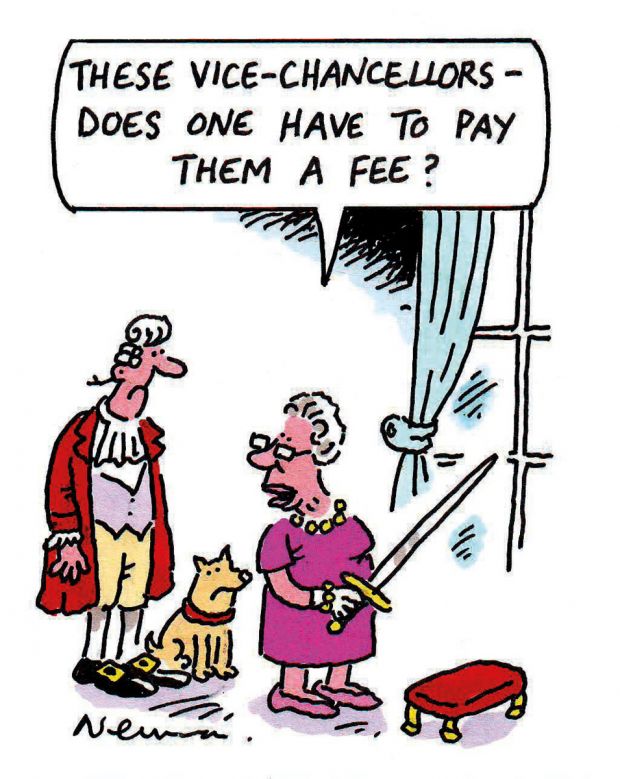
- The University of East Anglia scooped the top prize at this year’s Times Higher Education Leadership and Management Awards 2014. Held at Grosvenor House Hotel in London on 17 June, UEA picked up the Outstanding Leadership and Management Team 2014 for its “commitment to improving teaching quality…and a focus on boosting staff-to-student ratios”. Others presented with awards by the host, comedian Rob Brydon, included the University of West London (Outstanding Human Resources Team), the University of Edinburgh (Outstanding Marketing/Communications Team), the University of Cumbria (Outstanding Finance Team) and the University of Birmingham (Outstanding International Strategy). “Competition was particularly fierce this year, with more entries from across the UK than in any previous year,” said John Gill, THE editor.
- It may have supposedly passed the Turing test, but the computer program known as “Eugene Goostman” flunked the John Humphrys test. Interviewed by BBC Radio 4’s fiery Today presenter on 11 June, Goostman, who had apparently fooled 30 per cent of expert judges into thinking he was human, did little to convince listeners that he was anything but a “chatbot”, who rarely answered any questions in a coherent way. His own inane patter and odd questions about Humphrys’ occupation obviously did not endear him to the broadcaster. “I’m just not interested in you really. Goodbye,” was Humphrys’ retort. Since the “landmark” Turing achievement was announced by the University of Reading on 7 June, it has been criticised by many in the scientific community as a publicity stunt. The Financial Times’ Izabella Kaminska argued on 14 June that the test was rigged because expert judges were told Goostman was a 13-year-old Ukrainian boy and could therefore assume that “awkward answers [were] down to non-native speaker syntax errors or teenage inexperience”. Other media fire was aimed at the academic who claimed Goostman had passed the test, Reading’s “cyborg” visiting professor, and Coventry University deputy vice-chancellor, Kevin Warwick. The Daily Telegraph said he was “considered a maverick” in the science community but he told the paper that people were just “pointing fingers”.
- The heads of the universities of Birmingham and Nottingham have become the latest vice-chancellors to be knighted: David Eastwood and David Greenaway were given the title in the Queen’s Birthday Honours announced on 13 June. Knighthoods were also bestowed on former Medical Research Council chief executive Colin Blakemore and Lancaster University psychology professor Cary Cooper. The honours for the two Davids means that half of all vice-chancellors in the 24-strong Russell Group are either a Sir or a Dame. How long before non-titled “serfs” are in a minority in the group?
- A former University of Liverpool student has been let off a £4,510 fine after returning a library book 61 years late, The Times reported on 14 June. Ron Webster, 91, was a postgraduate student and research assistant when he borrowed A. R. Radcliffe-Brown’s Structure and Function in Primitive Society in 1953, which recently re-emerged from his own library, the paper said. “I cannot condone the late return of books but I remitted the fine of £4,510 on the condition that Mr Webster agreed to live an exemplary life and return all his books on time,” joked university librarian Phil Sykes.
- Shortly after J. K. Rowling spoke out against Scottish independence, several former university principals declared their pro-union sympathies. In a joint statement on 16 June, nine former heads of Scottish universities say they “firmly believe that the brightest and best future for higher education in Scotland is to remain in the UK”. The risks to higher education of leaving the union “considerably outweigh any benefits”, they add. Signatories include the former leaders of Aberdeen, Edinburgh, Glasgow, St Andrews, Stirling and Strathclyde universities, whose current vice-chancellors have stayed silent on how they will vote in the September referendum. “Is it healthy for democracy that former principals…feel they can have a louder public voice than current leaders?”, asked Cara Aitchison, vice-chancellor of the University of St Mark and St John, on Twitter.
Register to continue
Why register?
- Registration is free and only takes a moment
- Once registered, you can read 3 articles a month
- Sign up for our newsletter
Subscribe
Or subscribe for unlimited access to:
- Unlimited access to news, views, insights & reviews
- Digital editions
- Digital access to THE’s university and college rankings analysis
Already registered or a current subscriber?
Please or to read this article.
